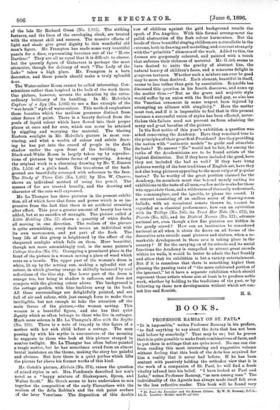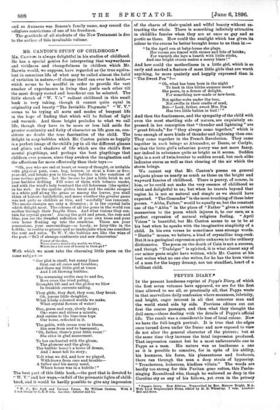BOOKS.
PROFESSOR RAMSAY ON ST. PAUL.*
"IT is impossible," writes Professor Ramsay in his preface, "to find anything to say about the Acts that has not been said before by somebody." That may be so ; but he proves that it is quite possible to make fresh combinations of facts, and to put them in settings that are quite novel. No one can rise from reading this most interesting and suggestive volume without feeling that this book of the Acts has acquired for him a reality that it never had before. If he has been content with passively holding the orthodox view that it is the work of a companion of St. Paul, he will find a fresh vitality infused into his belief. "I have looked at Paul and Luke," writes Professor Ramsay, "as men among men." The individuality of the Apostle has always made itself felt even to the less reflective reader. This book will be found very
• St. Paul ths Traveller and th. Roman Citizen. By W. M. Ramsay..D.O.L., LL.D. London: Rodde: and StJughton.
useful in deepening, sometimes, we think, in correcting, this impression. What it does in bringing out the character of the historian is, while of course less important, even more marked. Acute observation and careful study are combined to fill in witn curiously interesting detail what will have been to
most readers of the New Testament a somewhat vague outline. Professor Ramsay's suggestion that the "Man of Macedonia" who appeared in a vision to Paul at Troas, with the entreaty that he will come over and help them, was Luke
himself, will probably be somewhat startling. But there is manifestly much to be said for it. How did the Apostle know that the person in his dream was a " Macedonian "? The Macedonians wore no special dress. They claimed to be Greeks, and this being a matter that touched their pride, were probably careful to keep to Greek fashions. The Greek
words cimip Tr; favour the supposition that the figure seen by the sleeper was familiar to him. M.= guidant, and guidam is
used of a person known but for some reason not named. Paul and Luke had met by the chances of travel at Troas- possibly the Apostle had called in the professional services of the Greek physician—they may have discussed the question of Paul's further proceedings. In two directions the path had been definitely closed against him and Silas. They had been " forbidden to preach in Asia," and when they would have gone into Bithynia " the Spirit suffered them not." This negative guidance now becomes positive. The form of the new acquain- tance from Philippi appears in a dream, and his speech is
accepted as an authoritative utterance. Other indications of the connection of the historian with Philippi are not wanting. He omits the article before worai.ar, a well-known practice in Greek when the locality is familiar to the writer or speaker (so Anglice, "to go to town"). So his local patriotism comes
out when he speaks of Philippi " as the chief [first] city of that part of Macedonia." Strictly speaking, at that time Amphipolis was the first city ; Philippi, already a formidable rival, was soon to outstrip it, but it was not actually first except in the estimation of its own citizens :—
" It is an interesting fact that Luke, who hides himself so com- pletely in his history, cannot hide his local feeling ; and there every one who knows the Greek people recognises the true Greek ! There lies the strength, and also the weakness, of the Greek peoples. And that quality beyond all others has determined their history, has given them their strength against the foreigner, and their weakness as a united country.'
It was because he was a Greek that Luke speaks of the people of Melita as barbarians. As a Greek he readily understood the surroundings amongst which Paul found himself at Athens, but shows himself unacquainted with Roman usages, and takes up an unsympathetic attitude towards the Jews. The passion of affection which the Apostle felt for his countrymen, even when they were most hostile to him, which even led him to utter the startling paradox, " I could wish that myself were accursed from Christ for my brethren, my kinsmen according to the flesh," found no echo in his follower. Great too was Luke's interest in the sea. The land-journeys are dismissed with a few words ; the sea- voyages are described with a careful attention to details, not because he was a sailor, for he does not show technical knowledge, but because the love of the element was in his Hellenic blood.
All this sounds strange, possibly shocking, to the believers in a literal, mechanical inspiration, but it adds immensely to what, after all, is the essential thing, the confidence that we have in the Acts as the genuine, first-hand record of the Apostle's missionary work. Of course, there are things that defy explanation. So there are in Thucydides and Tacitus ; so there probably will be in the histories of to-day, when the key to some at least of their statements is lost, as lost it will certainly be in the course of ages.
From the writer we pass to the hero of his story. Nothing could be more marked than the distinction with which St. Paul stands out on the canvas. Compared to him the other chiefs of the Christian community are but as names. He is the many-sided man, becoming all things to all men ; a Jew, a Roman, a Greek, according as his work called him to be. Of the second and third of these characters the scenes at Cyprus and at Athens are typical. At Cyprus he comes out with almost startling suddenness as the Roman citizen.
He has of course always had the double name, been Paul as well as Saul. Now before the proconsul, himself another Paulus, he finally elects, so to speak, to be called by the
Roman appellation. The act marks the line which be is to take. His work as a missionary is to follow the course of Roman dominion :- "When Paul came thus forward under his new aspect and per- sonality, he was inaugurating a new policy. He was appealing direct for the first time to the Graeco-Roman world as himself a member of that world the historian fixes the psycho. logical moment precisely at the point where the Apostles faced the Magian in the presence of the procmsul of Cyprus. Amid the conflict of the two religions before the R mem governor, Paul stepped forward in his character of citizen of the Empire ; and his act was followed by that transport of power, which attested the grace that was given to the bold innovator, and the Divine approval and confirmation of his step."
Another significant fact is the pre-eminence which Paul
now takes among the missionaries of the Church. Ic has hitherto been Barnabas and Saul ; thenceforward it is Panl and Barnabas.
At Athens he becomes as thoroughly Greek as he had been Roman at Paphos. Professor Ramsay writes :—
" This extraordinary versatility in Paul's character, the un- equalled freedom and ease with which he moved in every societ), and addressed so many races within the Roman world, were evidently appreciated by the man who wrote this narrative, for the rest of Chapter XVII. is as different in tone from XIII. as Athens is different from Phrygia. Only a writer who RDA in perfect sympathy with his subject could adapt his tone to it so perfectly as Luke does. In Ephesus Paul taught in the school of Tyrannue' ; in the city of Socrates he discussed moral ques- tions in the market place. How incongruous it would seem if the methods were transposed!"
The disputed question of how Paul came to deliver the famous discourse on "Mars' Hill" receives here what seems a very probable answer. The interference of the philosophers was scarcely friendly. Some of them applied to him a very depreciatory epithet. " Babbler " means " ignorant plagiarist," "a picker-up of learning's crumbs," as Dean Farrar has it, "a pretender," we might say, trying to make a show of abun- dance with the crumbs that fell from the tables of others. That there was no formal trial is clear. We hear of no charge, no accuser, no sentence. Neither was it a condo ad populism. The place was not suited to a large meeting. Still less was it a condo ad clerum, if we may speak of the philoso- phers as clerics. The philosophers were no worshippers of the multiplied images which crowded the streets and squares of Athens. Paul was brought before the Council. He "stood in the midst of Mars' Hill," a phrase used colloquially, as in
Luke's manner for the Council. Why, then, was he brought before it? To justify, if he could, his claim to be teacher.
Teachers were always resorting to Athens, and the Council of Areopagus was the tribunal, the University Court which judged their pretensions. Exercising a disciplinary juris- diction over the students, it probably could give or withhold
a license to teach. The Apostle seized the opportunity. Be- addressed himself, not to the Court only, but to the audience. Unfortunately, this was of frivolous temper, caring only for novelty, and the effort was, as a whole, a failure. Measured by ordinary standards it might seem a success. One member
of the Court was convinced, and other men of less importance; one woman is mentioned, probably a freed woman, for no
well-born matron could possibly have been there, possibly, as Professor Ramsay conjectures, an educated Heta;ra. But when multitudes were converted in a day, five or six were but a scanty harvest.
These specimens will give some idea of the highly sug- gestive treatment which Professor Ramsay has given to his subject. We can but barely mention one or two other points
of interest. One of these is the comparison of the Bezan text with that of the MSS. on which our Testament is founded, Its additions and explanations are often suggestive, but they frequently show a later band which has got out of touch, with the tone of the first century. Another is the possible re- lation between Seneca and Paul. That the two ever met, or that the Apostle influenced the philosopher, Professor Ramsay. does not believe. But be suggests that they may have hack
a common term, so to speak, in Athenodorns of Tarsus, a teacher from whom Seneca quotes a passage in which life is compared to a warfare. A more important matter was Seneca's influence in bringing about the " generous freedom
with which all religious questions were treated" during the earlier half of Nero's reign. The inscription, somewhat later in date, found at Ostia " M. Annaeus Paulus to M. Annaeus Paulus Petrue, his very dear son," is undoubtedly Christian,
and as Annaeus was Seneca's family name, may record the religious convictions of one of his freedmen.
The gratitude of all students of the New Testament is due to the author of this invaluable volume.








































 Previous page
Previous page